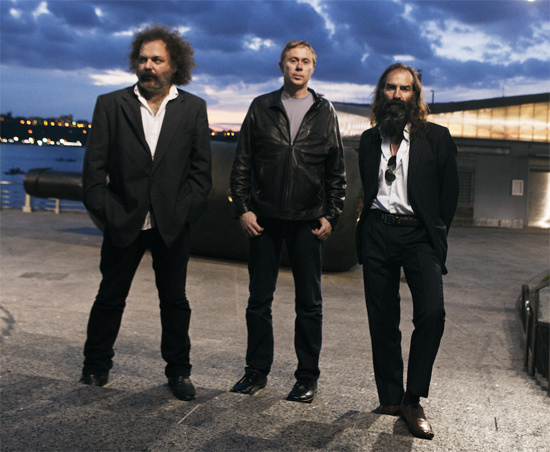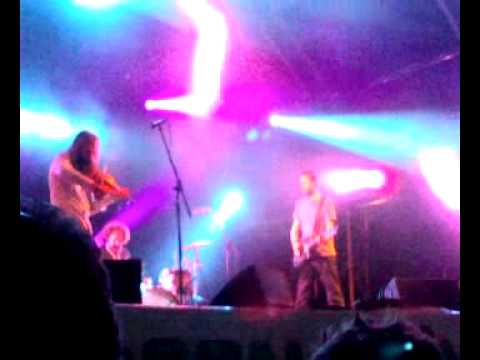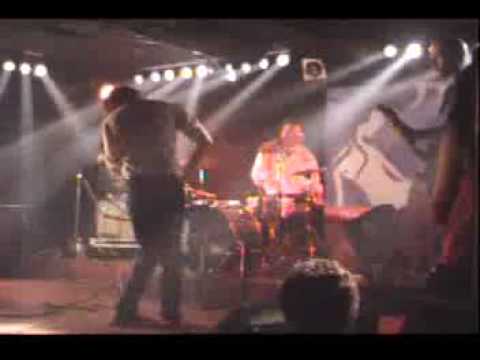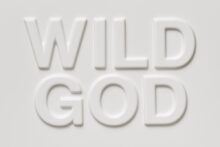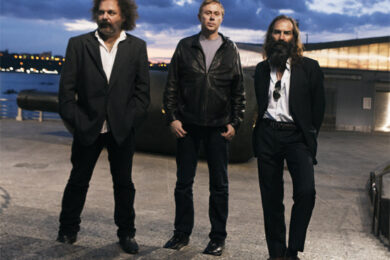Green Man Festival, 2009. The end of a damp weekend in a Welsh valley, the swollen waters of the River Dee gurgling past just behind the main stage. As a fine drizzle fell (blessed respite after the deluge that had blasted the site for much of the duration), The Dirty Three took to the stage before Wilco’s headlining set. It must have been a strange time for band. Busy with their various other projects – violinist Warren Ellis with the Bad Seeds, Grinderman and his film soundtracks with Nick Cave, drummer Jim White and guitarist Mick Turner with Cat Power and Will Oldham among others – The Dirty Three’s last album, 2007’s Cinder had felt rather conventional, and the band seemed to exist only in sporadic live appearances.
On that night, though, they won over new converts in their hundreds, even thousands, people streaming down the hillside to watch this emotional, intense, bravura performance, Warren Ellis scything away at his violin, flobbing up into the air and letting it land back down on his suit and beard.
As ever, Ellis’s intersong chat was a contrast to their music ("this song is about going away on holiday, coming home and finding out that all your friends have gone and died"), heightening its strange emotional power. Yet one of Ellis’ rambles seemed to suggest that The Dirty Three were in a sticky situation. He made a full confession that the trio were suffering from a severe case of writer’s block, struggling to come up with new ideas. Perhaps, Ellis suggested, the audience might like to provide some?
Winter 2012, and the violinist is on the phone from his Parisian home discussing the band’s new post-blockage-clearance LP Toward The Low Sun, a brilliant return to the raw, fragmented sound that characterised their early work. So Warren, did anyone from the Green Man crowd get in touch?
Warren Ellis: Nobody sent anything in, the lousy buggers. We’ve had to do it ourselves. We didn’t have one person, though I’m not sure how you’d send an idea. We had to bite the bullet and do it on our own.
How did you kickstart things when it came to the new LP?
WE: We had got together on a few occasions and it didn’t feel like it had moved together from the last album that we’d done. I guess I was wondering if we’d said about as much as we could. When that happens, you can’t help but feel a bit spooked by it. But this thing that happens when the three of us get together and play live, this energy happens that’s very unique to the group, and we all still really feed off it, and really want to protect it and keep it going. Getting out and playing live certainly made us want to continue, and reminded us that we needed to work at it. We eventually reconvened in Australia and did a bunch of dates in Japan for one of Barry ATP’s events. We talked a lot there, and had this time to sit down and talk and were able to realise that that was the way back into it, to approach it with the element of risk that we always like to have when we play live. We went into the studio with very little, and tried to make it more challenging again, take more risks, and really open it right up.
I think what we’d been trying to push towards on the last few albums, trying to reign everything in a bit and seeing how the way we played was affected when we made the compositions shorter and more controlled, served a purpose in one sense. But it also took away something from what was instinctively really important about the group.
What was different this time, then?
WE: We went into the studio with certain ideas. I particularly wanted to free Jim up and not have him locked into playing a beat and to be able to play as abstract as he wanted. We wanted it to be more improvised again. Once we’d spoken about it it became obvious what we wanted to do.
It feels quite obvious when the opening track ‘Furnace Skies’ hits you that it’s a different kind of record
WE: Yeah the first two tracks were the first two things that we laid down. We’re not like a jazz band or a free form band that starts to play, there’s a structure to our music, as basic as it may be, and we work within that. But there’s also a way that we like to be able to move things around, and play with dynamics or phrasing or whatever, that’s where the fun comes in playing night after night and it feels like it could fall apart at any moment. There are times where the shows seem to work really well, and times when they seem to fall flat on their faces, and that’s really attractive to us, it was always important to us to have that element in there. You can whistle a tune, most nights.
Is that element of risk what gives the emotional resonance for the audience?
WE: It’s only in doing these interviews that I’ve realised we’ve been around for such a long period of time, off and on the radar but we’ve always been around, and then realising that the distance between our albums these days warrants a fucking comeback tour. It’s pathetic that it’s come to that. I just pray ABBA don’t reform, I hope they hold their ground because when they do we know it’s all gone to… I mean I understand they need to get together and make some money, but I guess it’s a thing about getting old is you realise seven years can be a comeback. Anyway, we never really went away, we were out there ploughing the same field. I guess like you say we connected with new people. It’s interesting because we’ve never really changed what we do, we’ve just been out there in some way, playing. I’ve been out there with the other groups I’m in, and Jim as well. It feels like there’s been a continuity, but the past ten years I’ve never been busier. It’s been great. It’s how you imagine it should be when you’re doing something creative.
I’ve just never seen the point of working and working and working on something when you can just put something out and live with the mistakes, and learn from them and move on. That’s what I love about what I’ve been able to do with the different areas that I work on, the different groups and the film work. It all informs what you do, it’s not like you pick up where you were seven years ago, you hopefully constantly are informed, and are changing the way you think and approach things, no matter what it is. It’s part of the continuum really.
How different is it from the early days though?
WE: When we started, having a violin but not having a singer or a bass player was enough to get you beaten up. It was fantastic, it was so wild. These days there are festival bills filled with unusual line-ups, they’re par for the course. But but then it was an unusual thing to be doing on the back lots of Australia, it’d get you kicked out of town.
Do you miss that?
WE: Ah no, I think the thrill seems to be there and you still come up against it. It always surprises me, like that festival we did, when you get that really good reaction. For quite a while it was so thrilling to know what was going to happen. You still don’t know, you always get people yelling out ‘this is shit’ and stuff. The driving thing isn’t to get up people’s nose, though that was a positive aspect, I must say, it was really great to feel like you were rubbing people up the wrong way. Also the great thing was that it really divided people, they really liked it or really hated you. I remember doing shows where there’d be five people in the audience, and three of them just wanted to beat you up, and the other two wanted to beat them up, or just get drunk out of their brain. The worst thing is always indifference. People saying ‘it’s OK’ is a polite way of saying ‘that’s crap’. To get a reaction out of someone without saying a word to them really was fantastic.
If you take bands as being like relationships, what’s it like given you’ve all been having sordid affairs?
WE: Everyone’s always understood that it’s been great to be able to go and do different things. I think if we’d just stayed as the three of us I don’t think we’d have been able to stay together. Doing different stuff is like having affairs, it’s great, not that I know. I know Dirty Three, when we used to do it all the time for the first few years when we’d do it for eleven months of the year and then just go totally insane. There was point in the late 90s when I realised it wasn’t possible to maintain the intensity all the time, and I had to take a step back from it. It became so all-encompassing.
What do you think your work with the Bad Seeds, Grinderman or the film projects has brought to Dirty Three?
WE: Certainly I think the possibility to try different things, to take different avenues, to explore different ideas. With us early on I was so amazed that something might have happened, that we might come up with a tune, I never really tried to question too much, and then I think after doing a variety of different things you start to be able to say hang on, let’s take some control of it. I found doing film work liberating. Things are taken out of your hands, and to be told that what you’ve done is not what’s wanted, even though you might think it’s really great, and then to have to go in from scratch and do something it at first seems really daunting but becomes really liberating. Directors will say ‘take your favourite thing, cut it out, then start from there’. There’s something liberating about flying by the seat of your pants and letting go. Early on you need to have this sense of a gang, not caring what anyone else thinks, to help you form your identity. It’s so empowering. But at a certain point after a while you need to start to take other kinds of information.
Thinking of the live dynamic, people do find you very funny. It almost informs the music, you get to dance around a bit more. People call you the front man
WE: It was never really the thing, it was jsut something that happened. It actually came from two things when we started out. People would say ‘what are you doing?’ I’d say ‘we’ve got this instrumental band’. We always had such a basic narrative going on. A lot of our early songs were very melancholic and they come from a very sad sort of place, and they come out of experiences that were kind of sad. It just seemed like the only hurdle for people was that there weren’t lyrics, and if only people could latch onto the sentiment it mightn’t be such a problem for them. it was very early on, I’m talking after a month of playing, we already had ‘Everything Is Fucked’, the songs had this certain thing about them, a loneliness but also something heroic. I remember one night I started talking because I’d had a really boring day, I started telling my day and everyone started pissing themselves laughing. I just kept doing it, telling people what was going on in my day, and it seemed that at that point in time people never addressed the audience, and it felt like there something really kind of happens when you do that, people realise they’re involved, they’re not just stood there watching something. It just went on from that to what it is now, whatever it is now. It was never an attempt to explain what was in there. The truth in there is probably what they didn’t think was the truth, and the abstract was what they thought was the truth. It’s like anything, the intent wasn’t to say ‘this is what it’s about’.
What was the best moment of this whole process?
WE: I think the best moment for me is when you realise you have something. When you’re in making a recording you have these moments where you feel like something has gone somewhere, or that it’s developed, or that you know just by looking at each other that something new has happened. I never know, never ever know, when I go in there whether there’s going to be something in there. With this, I think it was when we realised it had gone somewhere and that we had enough material that we all felt good and positive about. That was probably a relief too.
After the concern that you might not have anything else to say?
WE: We never rehearse together, we rehearsed twice I think in the first few years, and that was the first day we got together we rehearsed in my kitchen and played that night, making the songs really long because we had to play for three hours or something. That was the way we operated. And then we played every week, in this bar. It was meant to be background music, the guy didn’t want to play CDs, he wanted to do something a bit different. We’d sit in this bar, with no PA. It’d be this bar full of your mates, everybody off their brains, once a week, and no-one had to clear up the mess at the end of it. There was this space, the possibility to do whatever you wanted on your instrument, nobody was going to say ‘hey look, the chorus is coming, now shut up’. Singers would come up to us, particularly and say ‘wow it’s amazing how much space you all take up, and you just don’t get this’. We never really had any discussions apart from once, I suppose it’s in my nature to be the oracle of doom, I probably asked the others at our second show, ‘how long do you think we’ll go for?’ And they go ‘well, probably until we haven’t got anything else to say’. That’s always been the way we’ve operated, none of us would continue if we didn’t feel like we had something to say, as corny as that might sound. Hopefully you can always find a new way in, it’s just not always apparent.
Are you still the Oracle of Doom in the Dirty Three?
WE: Probably not. I was one of those kids who when it was the start of school holidays I’d imagine it was the end. I’ve got myself out of that these days, but I do recall pre-empting the future on a lot of occasions as a kid and a teenager.
So what next? Would your soundtrack work ever be a Dirty Three thing too?
WE: As a group we can’t function within certain kind of parameters, and I think if we did it’d take away what’s interesting about the group. If we did it’d have to be a specific thing and the person would have to really want that thing that we do. A whole score? I don’t know if we’ve matured enough for that. There’s something unmanageable about us, there’s something that’s quite unwieldy about the way that we operate and the music that comes out. If you like that sort of thing it’s great, if you don’t then it’s just unbearable. That’s just how it’s always been.
Toward The Low Sun is out now on Bella Union. The Dirty Three play All Tomorrow’s Parties I’ll Be Your Mirror at Alexandra Palace in May, for tickets and more information visit the ATP site

